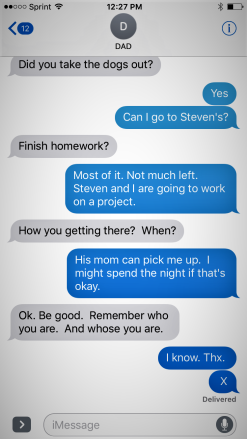(As seen on The Today Show, Good Housekeeping, HerViewFromHome, ScaryMommy, The Huffington Post, Mamamia, MomsEveryday, and numerous social and news media outlets. UPDATED – 3/3/2017)
Friends, as most of you know, I get to spend an hour each week with a group of young people going through addiction recovery. Yes. Young people. I’m talking teenagers who are locked away for at least six months as they learn to overcome their addictions. I’m always humbled and honored to get this time with these beautiful young souls that have been so incredibly assaulted by a world they have yet to understand. This also comes with the bittersweet knowledge that these kids still have a fighting chance while several of my friends have already had to bury their own children.
Recently I asked these kids a simple question: “How many of you have found yourself in situations where things started happening that you weren’t comfortable with, but you stuck around, mainly because you felt like you didn’t have a way out?”
They all raised their hands.
Every single one of them.
In the spirit of transparency … I get it. Though in my mid-forties, I’m still in touch with that awkward boy who often felt trapped in the unpredictable currents of teenage experiences. I can’t count the times sex, drugs, and alcohol came rushing into my young world; I wasn’t ready for any of it, but I didn’t know how to escape and, at the same time, not castrate myself socially. I still recall my first time drinking beer at a friend’s house in junior high school—I hated it, but I felt cornered. As an adult, that now seems silly, but it was my reality at the time. “Peer pressure” was a frivolous term for an often silent, but very real thing; and I certainly couldn’t call my parents and ask them to rescue me. I wasn’t supposed to be there in the first place. As a teen, forcing down alcohol seemed a whole lot easier than offering myself up for punishment, endless nagging and interrogation, and the potential end of freedom as I knew it.
X-Plan
 For these reasons, we now have something called the “X-plan” in our family. This simple, but powerful tool is a lifeline that our kids are free to use at any time. Here’s how it works:
For these reasons, we now have something called the “X-plan” in our family. This simple, but powerful tool is a lifeline that our kids are free to use at any time. Here’s how it works:
Let’s say that my youngest, Danny, gets dropped off at a party. If anything about the situation makes him uncomfortable, all he has to do is text the letter “X” to any of us (his mother, me, his older brother or sister). The one who receives the text has a very basic script to follow. Within a few minutes, they call Danny’s phone. When he answers, the conversation goes like this:
“Hello?”
“Danny, something’s come up and I have to come get you right now.”
“What happened?”
“I’ll tell you when I get there. Be ready to leave in five minutes. I’m on my way.”
At that point, Danny tells his friends that something’s happened at home, someone is coming to get him, and he has to leave.
In short, Danny knows he has a way out; at the same time, there’s no pressure on him to open himself to any social ridicule. He has the freedom to protect himself while continuing to grow and learn to navigate his world.
This is one of the most loving things we’ve ever given him, and it offers him a sense of security and confidence in a world that tends to beat our young people into submission.
 However, there’s one critical component to the X-plan: Once he’s been extracted from the trenches, Danny knows that he can tell us as much or as little as he wants … but it’s completely up to him. The X-plan comes with the agreement that we will pass no judgments and ask no questions (even if he is 10 miles away from where he’s supposed to be). This can be a hard thing for some parents (admit it, some of us are complete control-freaks); but I promise it might not only save them, but it will go a long way in building trust between you and your kid.
However, there’s one critical component to the X-plan: Once he’s been extracted from the trenches, Danny knows that he can tell us as much or as little as he wants … but it’s completely up to him. The X-plan comes with the agreement that we will pass no judgments and ask no questions (even if he is 10 miles away from where he’s supposed to be). This can be a hard thing for some parents (admit it, some of us are complete control-freaks); but I promise it might not only save them, but it will go a long way in building trust between you and your kid.
(One caveat here is that Danny knows if someone is in danger, he has a moral obligation to speak up for their protection, no matter what it may cost him personally. That’s part of the lesson we try to teach our kids—we are our brother’s keeper, and sometimes we have to stand for those too weak to stand for themselves. Beyond that, he doesn’t have to say a word to us. Ever.)
For many of us parents, we lament the intrusion of technology into our relationships. I hate seeing people sit down to dinner together and then proceed to stare into their phones. It drives me nuts when my kids text me from another room in our house. However, cell phones aren’t going away, so we need to find ways to use this technology to help our kids in any way we can.
Since first publishing this piece, I’ve seen an incredible amount of discussion about the pros and cons. Here are some of the questions folks have had:
Doesn’t this encourage dishonesty?
Absolutely not. It actually presents an opportunity for you as a parent to teach your kids that they can be honest (something DID come up, and they DO have to leave), while learning that it’s okay to be guarded in what they reveal to others. They don’t owe anyone an explanation the next day, and if asked can give the honest answer, “It’s private and I don’t want to talk about it.” Boom! Another chance for a social skill life-lesson from Mom and Dad.
Does this cripple a kid socially instead of teaching them to stand up to others?
I know plenty of adults who struggle to stand up to others. This simply gives your kid a safe way out as you continue to nurture that valuable skill.
What if this becomes habitual?
If you’re regularly rescuing your kid, hopefully your family is having some conversations about that.
If you don’t talk about it or ask questions, how do they learn?
If you’re building a relationship of trust with your kids, they’ll probably be the ones to start the conversation. More importantly, most of these conversations need to take place on the FRONT-side of events. Ever taken a cruise? They all make you go through the safety briefing in case the boat sinks. They don’t wait until the ship’s on fire to start telling you about the lifeboats. Talk with them. Let your kids ask questions and give them frank answers.
If they’re not where they’re supposed to be, shouldn’t there be consequences?
Let’s be honest. A kid in fear of punishment is a lot less likely to reach out for help when the world comes at them. Admitting that they’re in over their heads is a pretty big life-lesson all by itself. However, don’t get so caught up in all of the details. This isn’t a one-size-fits-all scheme. Every parent, every kid, and every situation is unique. What it might look like in your family could be totally different from mine—and that’s okay.
I urge you to use some form of our X-plan in your home. If you honor it, your kids will thank you for it. You never know when something so simple could be the difference between your kid laughing with you at the dinner table or spending six months in a recovery center … or (God forbid) something far worse.
At the end of the day, however, the most important thing is that you’re having some open, honest discussions with your kids. Keep building a relationship of trust. This isn’t the same world we grew up in. It’s not like sneaking a beer at Billy’s house anymore. Our kids face things on a daily basis that—given one bad decision—can be fatal. Don’t believe me? I’ve been to funerals for great kids from awesome families.
Friends, it’s a dangerous world. And our kids are out in it everyday.
Prayers for strength and compassion to the parents out there as we all try to figure out this whole parenting gig—it never gets easy.
I beg you to share this piece. Talk about it with your kids. If this somehow gives just one kid a way out of a bad situation, we can all feel privileged to have been a part of that.
#xplan
Blessings, friends.
Release date from Simon & Schuster / Howard Books: June 11, 2019.


Pingback: Communication as a Self Defense? | AIM Martial Arts
Pingback: Understanding Teen Drug and Alcohol Abuse - Western Youth Services (WYS)
Pingback: Dad Receives Coded Text Message From Son, Rushes To Help Him - THE TRUTH
Pingback: Teen Curfews: How Late Are You Letting Your Teen Stay Out and Do They Have an Exit Plan? – Cute And Fluffy
Pingback: Dad Receives Coded Text Message From Son, Rushes To Help Him – Usa News